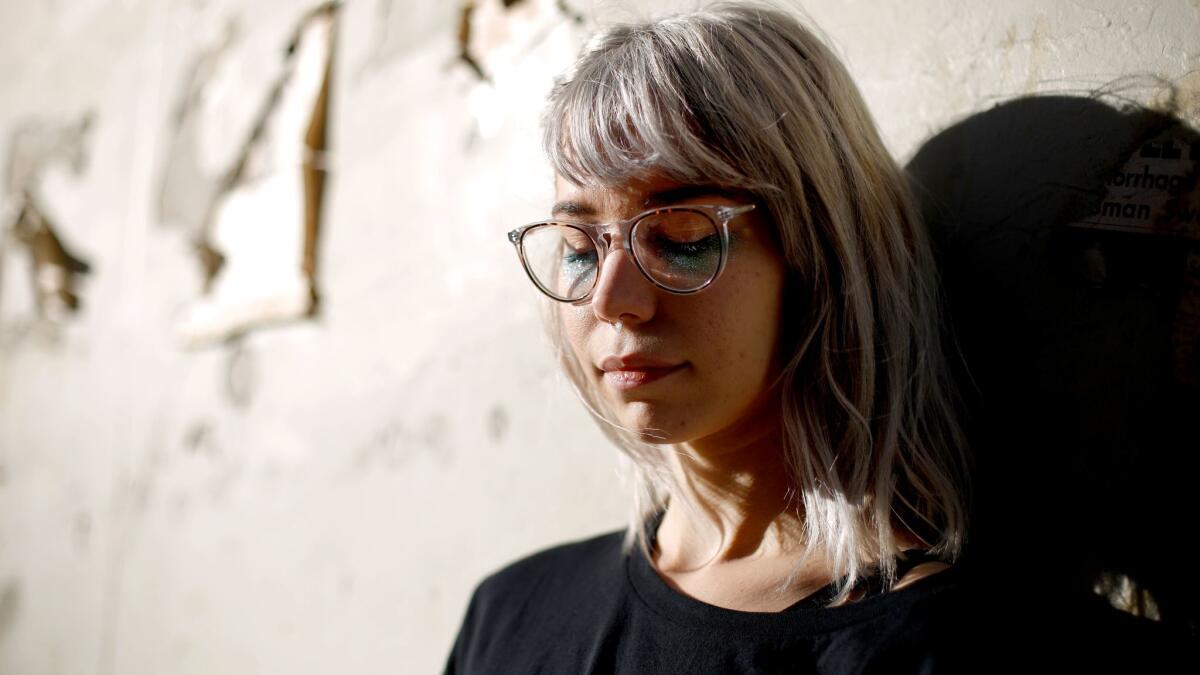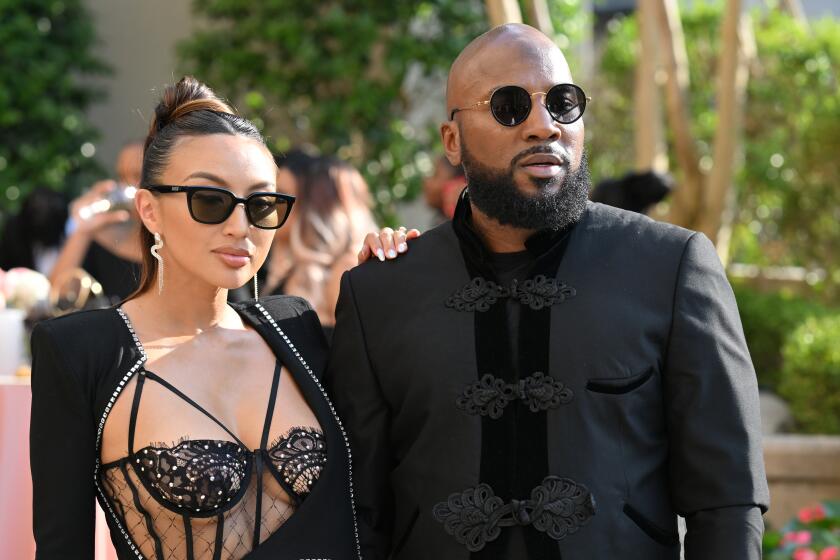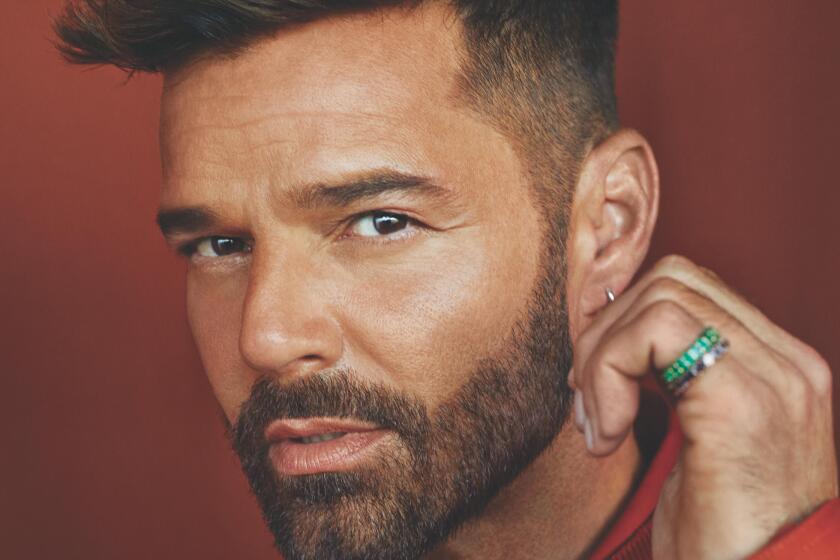For Mija, club-music success came quickly. Now she’s trying to subvert it

Compared with her current career as one of L.A.’s fastest-rising club music DJs, Amber Giles’ first consistent music gig wasn’t quite so glamorous.
After a teenagedom spent promoting raves around her hometown of Phoenix, Giles finally landed a regular slot at a professional venue. The club, however, was actually a local Sheraton hotel, where she had to win over the local techno kids and some less-than-party-primed business travelers.
That gig gave her the genre-agnostic, pointedly competitive streak that still drives her shows today.
“I grew up really fast,” she said. “Raves felt very punk rock and rebellious, and a lot of my friends were older house-music dudes and I wanted to prove to them that I could do this too.”
Now just a few years later, she’s been championed by Skrillex, played some of the biggest festival stages in American EDM, and now headlines this Saturday at Union, where a smattering of her favorite acts will also play DJ sets that are pointedly out of their genre comfort zone.
The ascent of the 24-year-old Mija in an often bro-dominant scene is something to cheer for.
Sitting outside a cafe around the corner from her Arts District apartment, Mija’s hair is dyed a blinding silver-pastel, and she’s dressed head-to-toe in streetwear of her own label, Made by Mija. It was kind of a droll gesture -- even her knee socks were on-brand -- but she trained in fashion production before turning to music, and it all fit her air of icy, earned confidence.
Mija’s launch to dance-music stardom came quickly, after organizers of the popular Burning Man art-car Kalliope heard her DJing at her birthday party in Arizona. They brought her out to play a Bonnaroo after-party, where Skrillex caught word of her blend of vintage rave sounds and contemporary, hard-kicking trap and bass music. He jumped on the decks with her for a collaborative sunrise set. With that instant-vouch, a star was born.
Giles was young but already an experienced performer, and she indeed grew up quickly in this new spotlight.
Within a year, she’d played Coachella’s Do Lab stage, Hard Summer and well-received sets at West Coast “transformational” fests like Shambhala. That kind of rapid upscaling might have jolted other young DJs just hitting big stages, but Mija found that she didn’t have time to second-guess herself.
“It more so hit me later, when I looked back like ‘Oh, I just did that’,” Giles said. “You just hit the ground running and don’t think about it.”

Scene veterans quickly caught on to her unorthodox, omnivorous approach to new and old electronic sounds. Her sets will splice up vintage house-music uplift, noisy bass music and sparse, mean trap drums that teeter right on the edge of populist and tasteful. She’s no underground elitist, but she’s too restless to be easily categorized, even in today’s fractious post-EDM dance music world.
“I love what Mija’s doing for the scene,” said David Macklovitch, the singer and producer from Chromeo, who is playing his own DJ sets of vintage funk on tour with Giles, along with openers like the rapper Joey Purp and deep house producer Durante. “She could be content but she’s pushing genre boundaries, striving to open the mind of her audience and elevating the art of DJing.”
All that raises the question: What to do with her hotly-expected debut record?
Her single “Crank It,” also featuring the producer Ghastly and a rowdy turn from rapper Lil Jon, was a hit for Skrillex’s OWSLA label last year. Longform mixes like her rangy BBC Radio 1 session for Diplo’s show proved that she can skillfully weave all sorts of sounds into a coherent whole. But this deep into her career, she still has yet to release even a full EP of her own productions.
That’s not such a big deal in today’s singles- and streaming-driven club music world. But Giles, who DJed long before learning to produce her own tracks, is thinking hard about how to best represent herself on record now that she has a wider audience.
“It’s taken a while for me to figure out my sound,” she said. “It’s tough, coming from DJing, because you know how things are supposed to sound, but you also don’t want to be formulaic about it.”
One thing she is not overthinking, however, is the current conversation about how to open up mainstream dance music to more women DJs and producers. Giles said that such work is definitely important for fostering talent and making the scene safe for everyone. But Giles thinks her own self-possession and take-no-guff demeanor blunted the bad behavior that, sadly, might be expected from some male peers.
For the current rising crop of young female producers like Rezz and Louisahhh!, the question of “Will I be respected” has been answered affirmatively. The next job is to stake a claim for her own sound, wherever it takes her.
“It’s so subjective. I haven’t had a lot of experiences with sexism in this scene,” she said. “But growing up, I always just thought that if I owned it, people would believe in me. If I was insecure, it would show. So instead, just go out and own it and people will reciprocate.”
For breaking music news, follow @augustbrown on Twitter.
ALSO:
So long, Leonard Cohen. We need you now more than ever
What did Leonard Cohen really mean when he sang ‘Hallelujah’?
‘It’s like a stroll through the Louvre:’ PBS’ ‘Soundbreaking’ shows the magic of music-making
More to Read
The biggest entertainment stories
Get our big stories about Hollywood, film, television, music, arts, culture and more right in your inbox as soon as they publish.
You may occasionally receive promotional content from the Los Angeles Times.







